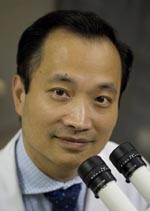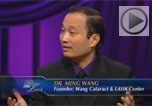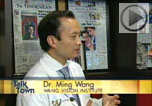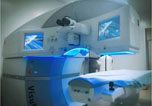- Over 55,000 LASIK and cataract procedures (including on over 4,000 doctors)
- The FIRST center in TN to offer Laser Cataract Surgery
- Introduced bladeless all-laser LASIK to the state
- Implanted the state's first FOREVER YOUNG™ Lens
- The first surgeons in the US to perform a new Intacs surgery to treat keratoconus
- Helped patients from 40 states and 55 countries
- International referral center for cataract surgery and LASIK complications
- Read Dr. Wang's book: LASIK Vision Correction
Why did you decide to have LASIK? Why did you choose Dr. Wang? How has your life changed since your LASIK procedure?
What is your advice for people considering LASIK?
Click to read more
| Article Library | Print This Page |
Chinese Healthcare Trade Mission Strengthens Lines of Communication
By: CINDY SANDERS, Nashville Medical News
In the fourth quarter of 2009, 30 Tennessee executives traveled to China on a 10-day trade mission to expand cultural and economic ties with the country that boasts the largest population in the world.
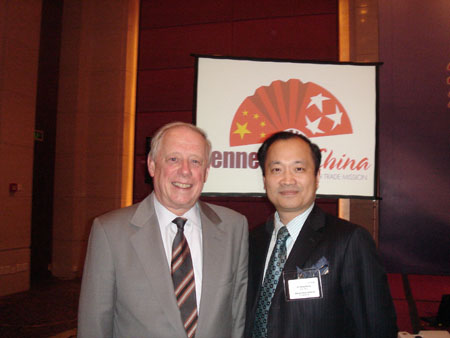 |
| Dr. Ming Wang and Governor Phil Bredesen of Tennessee, at Beijing, on Tennessee China Mission 2009 |
The 2009 trip allowed state executives to visit healthcare, government and industry leaders in Beijing, Xi’an, Hangzhou and Hong Kong. This trip, which was recapped at a meeting hosted by the Tennessee Chinese Chamber of Commerce (TCCC), focused heavily on building healthcare partnerships and nurturing relationships that have already been formed.
“We began our efforts to develop trade ties with China in 2007 when we opened the Tennessee-China Development Center in Beijing,” said Governor Phil Bredesen, who added the recent trade mission was a logical follow up to that effort.
“Currently, China is the third largest trading partner with Tennessee behind Canada and Mexico,” said Ming Wang, MD, PhD, director of Nashville-based Wang Vision 3D Cataract and LASIK Center and the founding president of the TCCC. Tennessee ranks as the 13th largest exporting state in America. According to the U.S.-China Business Council, Tennessee has increased exports to China by more than 1,000 percent since 2002. In 2008 alone, Chinese customers purchased $1.3 billion worth of goods and services from Tennessee manufacturers and providers. “TCCC’s first job is to increase that,” said Wang.
The surgeon, who attended the 2009 trade mission, noted an increasing number of Tennessee companies are interested in tapping into the tremendous growth seen in China. However, Wang added, “Because of the cultural, language and geographic distance and barriers, many Tennessee companies find it difficult to find how to venture into China to open markets. They need help to understand China’s culture, people, history, business environment, government regulations and market opportunities.”
This, Wang said, was the impetus behind launching the TCCC in 2007. “The Tennessee Chinese Chamber of Commerce was founded so it could provide a platform of communication and the exchange and collaboration between businesses here in Tennessee and those in China.”
He added, “Understanding the people, history and culture of other countries is no longer just an important thing to do as a member of the world citizenship. It is now an economic necessity. The number one challenge of a business of yesterday was how to make a product. The number one challenge of a business today is how to sell that product.”
Wang noted the United States has a $250 billion trade deficit with China so any movement toward exporting more goods and services to China would help offset the current imbalance. “We need to improve the competitiveness of our product in a world market,” he said. “To do that, first and foremost we need to understand our customers.”
While the TCCC helps Tennessee businesses establish relationships in China, a secondary service is to facilitate China’s desire to create ties in Tennessee.
“As China is growing economically, many Chinese businesses and investors are becoming more and more interested in the United States and Tennessee,” Wang said. He explained the rising labor costs in China coupled with import tariffs and transportation fees are edging the country closer to a tipping point where it will become more cost effective to produce products that are to be sold in the United States on American soil. “China is not there, yet, but it’s moving in that direction,” he said.
Tennessee Department of Economic & Community Development Commissioner Matt Kisber believes opportunities exist on both ends of the equation, as well. “Despite the global recession, China’s appetite for Tennessee products remains strong,” he said. “We believe there are real opportunities for additional Tennessee companies to increase exports to China, and we want to increase China’s knowledge about Tennessee’s business-friendly economic climate.”
For local healthcare firms, one of the most significant outcomes of the first trade mission was the signing of a memorandum of understanding with the Chinese Ministry of Health, creating a series of annual exchanges between experts in both China and Tennessee focused on improving delivery of healthcare in rural areas. That agreement has led to expanded communications and was a driver behind this most recent trip.
Scott R. Mertie, member-in-charge of Kraft Healthcare Consulting, LLC and a trade mission delegate, observed, “Their population is huge — almost 1.5 billion — and so many of the areas are rural. There’s been really no healthcare at all other than a few clinics scattered throughout the countryside.”
He found it ironic that while the United States debates expanding the government’s role in healthcare, China’s government-run system is looking to America’s private healthcare industry for ideas. He continued, “Historically speaking, their hospitals have all been run in some form or fashion by the government. The CEO of the hospital is generally a physician and is appointed by the government and doesn’t generally have a financial background. They don’t typically have a CFO.” As it becomes imperative to expand services and run more efficiently, Mertie said the Chinese have an interest in learning how Americans operate hospitals.
Increased demand for hospital beds in rural areas, more physicians and a broader healthcare infrastructure are driving China’s current healthcare investment. “In 2008, they had about four million beds in the country compared to 1980 when they had about two million beds,” Mertie said, adding the goal is to once again double the number of beds to hit eight million within the next decade.
Another emerging demand is for long-term care solutions. Like Americans, Mertie said the Chinese are facing increased healthcare demands from an aging population. “Their average life expectancy now is about 73 years old. When you go back to 1981, their average life expectancy was 67. In 1949, that age was 35,” he said.
Although it is considered extremely disrespectful to have someone else care for an aging parent and the skilled nursing facility is a foreign concept, Mertie said perceptions might be forced to change. He explained the “one child” rule has made it more difficult to care for aging parents. Furthermore, the country has become much more transient. As a result, adult children move to the cities to live and work … leaving the previous generation behind in hometown villages without a caregiver nearby. These factors could pave the way for American companies to gain entry into the marketplace.
“China really has three short-term goals to accomplish over the next couple of years. One, achieve basic healthcare coverage for all citizens both in rural and urban areas. Two, improve accessibility and quality of basic healthcare facilities. The third is to reduce the cost for citizens to receive healthcare services,” Mertie said.
“As far as opportunities, they are definitely there, but you definitely shouldn’t jump in,” he continued. Mertie, who has had conversations with various government officials in the months since returning from China, said, “It pays to do your due diligence. They just do things differently there, and you can easily get in over your head.” He cautioned that patience and enlisting the aid of partners who understand the Chinese culture are paramount to developing mutually beneficial partnerships.
That, noted Wang, is the strength of the TCCC. On a personal level, Wang, who is co-owner and medical director of Aier Eye Hospital Group with 20 private facilities in China, has the unusual viewpoint of being a business owner in both countries. A native of China, Wang moved to the United States in 1982 to pursue his education. Now a U.S. citizen, Wang lived in China for 20 years and has been in America for 27.
“Because I come from China, I’m familiar with the culture of both countries … the language of both countries. I think I’ve got a unique perspective and a unique responsibility to help my adopted country, the United States, to improve its economy by improving its business relationship with a rapidly growing country such as China.”
In the fourth quarter of 2009, 30 Tennessee executives traveled to China on a 10-day trade mission to expand cultural and economic ties with the country that boasts the largest population in the world.
Our new texbooks
A 501c(3) charity that has helped patients from over 40 states in the US and 55 countries, with all sight restoration surgeries performed free-of-charge.


